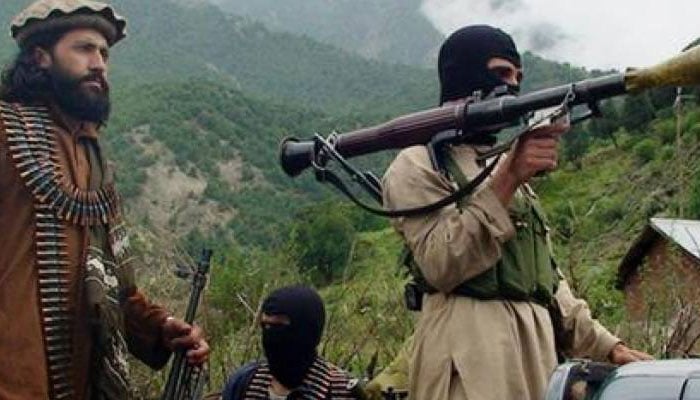Pakistan, TTP negotiating seventh peace pact
This time the Afghan Taliban are forcing the Pakistani Taliban to sign a peace agreement
PESHAWAR: After failed peace agreements in the past, Pakistan has once again resumed peace talks with the Tehreek-e-Taliban Pakistan (TTP). If the two sides reach a peace agreement, it will be at least the seventh agreement, not the first one with the Pakistani Taliban.
Apart from three major peace agreements in Shakai, Srarogha and Swat, the government entered into at least three peace deals with various militant groups in the former tribal areas but peace could not be achieved in the country and the government had to carry out several military operations to eliminate terrorists.
Historically, the two have been in talks for several times. For the first time, talks with the Taliban are taking place in Afghanistan, while all previous agreements were reached in Pakistan. The Pakistani authorities signed agreements with Nek Mohammad, Baitullah Mehsud, Hafiz Gul Bahadar, Sufi Mohammad, Maulana Fazlullah, Faqir Mohammad and Mangal Bagh, but none of the agreements with the Taliban factions lasted more than a few months. The Tehreek-e-Taliban Pakistan was officially formed in December 2007.
Security and Defence analyst and former secretary Security ex-Fata, Brigadier (retd) Mahmood Shah said there had been dozens of meetings and several peace agreements with the Taliban, but none of them succeeded. “I still believe that negotiations with the Taliban were neither successful in the past and nor will be successful in the future. The current government’s talks with the Taliban may have political motives; otherwise there is no need for talks with the Taliban. Such negotiations have never brought peace in the past. Are we going to repeat the same mistakes? Pakistani forces already defeated them and why we are trying to bring them back to our society,” he said, adding that the TTP is now weak and operating from Afghanistan, so there is no need to negotiate with them. Otherwise they will be strong again.
Ismail Khan, a senior journalist and expert on peace and conflict, is optimistic about the recent talks, saying there is a big difference between the past and the present situation. This time the Afghan Taliban are forcing the Pakistani Taliban to sign a peace agreement because they are under the protection of the Afghan Taliban, so they will guarantee peace talks. He said that the major cause for the failure of the previous talks was the presence of foreign terrorist organizations which were involved in terrorism along with the Pakistani Taliban.
“The political consensus in the country is essential for negotiations because in case of an agreement, all issues cannot be resolved without consensus”, he said.
The first agreement was signed in April 2004. The Shakai agreement was reached between Nek Muhammad Wazir and the Pakistani authorities for peace. The agreement came after the government launched a military operation in March 2004 to pressurize Nek Muhammad to cease supporting foreign militants, including Arabs, Chechens, and Uzbeks in South Waziristan. As part of the peace deal, the Pakistani government agreed to release Taliban prisoners and pay compensation to tribesmen for property damage during the operation. Nek Muhammad agreed to register foreign militants and stop cross-border attacks into Afghanistan. After the signing of the agreement, Nek Muhammad refused to surrender foreign militants. The government then launched another military operation in June 2004. Later on, Nek Muhammad was killed in a US drone strike in June 2004.
The second peace agreement was signed in February 2005 with Baitullah Mehsud in the Srarogha area of South Waziristan. The government agreed not to target Baitullah Mehsud or his supporters and they agreed not to attack Pakistani forces and shelter foreign militants. However, clashes between the military and the militants in South Waziristan increased in the subsequent months. Baitullah Mehsud himself was eventually killed by a US drone strike in August 2009.
Another agreement was signed with the North Waziristan-based commander Hafiz Gul Bahadar in September 2006, who was mainly involved in cross-border attacks into Afghanistan. The Pakistani government and Bahadar’s faction basically agreed to expel all foreign militants, such as Al-Qaeda and Uzbek militants, from the Pakistani soil. The peace deal broke down on May 20, 2007.
The fourth agreement was signed in May 2008. The coalition government of the Awami National Party and the Pakistan Peoples Party government reached a peace agreement in Swat with the Taliban. The two sides reached a 16-point agreement to bring an end to violence and restore peace. However; disagreements arose within a few days of agreement. However, the Khyber Pakhtunkhwa government agreed to implement the Sharia-based Nizam-e-Adl regulation in Swat on February 15, 2009, but the militants began attacking government officials and installations, as well as destroying electronics’ shops and schools.
The Pakistan army launched a decisive military operation Rah-e-Haq against Maulana Fazlullah and his fighters. Within two months of the major military operation, Maulana Fazlullah fled the Swat valley, and many of his commanders were either arrested or killed.
A similar agreement was reached with militant commander Faqir Muhammad in the Bajaur district after the Operation Sherdil in August 2008. Once the military operation concluded, the Pakistani security forces reached a non-aggression pact with the Bajaur militants.
Another agreement was agreed with Lashkar-e-Islam leader Mangal Bagh in the Khyber district after the operation in June 2008. The agreement was violated and the Pakistan army retaliated.
-
 Kate Middleton May Break Because Of Andrew Mountbatten-Windsor & Expert Speaks Out
Kate Middleton May Break Because Of Andrew Mountbatten-Windsor & Expert Speaks Out -
 Tom Cruise, Nicole Kidman Mend Their Relationship Following The Murder Of Rob Reiner, Wife Michelle Reiner?
Tom Cruise, Nicole Kidman Mend Their Relationship Following The Murder Of Rob Reiner, Wife Michelle Reiner? -
 Celebrities Who Struggle With Infertility
Celebrities Who Struggle With Infertility -
 Is Social Media Addiction Real? Experts Explain Signs And How To Cut Back
Is Social Media Addiction Real? Experts Explain Signs And How To Cut Back -
 Can App Stores Really Keep Kids Off Social Media? Here’s What Experts Says
Can App Stores Really Keep Kids Off Social Media? Here’s What Experts Says -
 Margot Robbie Fears Being Dubbed A 'dumb Blonde' Due To Major Reasons: 'Hates The Idea'
Margot Robbie Fears Being Dubbed A 'dumb Blonde' Due To Major Reasons: 'Hates The Idea' -
 How Kate Middleton's Hyperemesis Gravidarum Left Her 'not The Happiest'
How Kate Middleton's Hyperemesis Gravidarum Left Her 'not The Happiest' -
 USA Beats Canada For First Olympic Hockey Gold In 46 Years; Donald Trump, Barack Obama & Others Hail Historic Victory
USA Beats Canada For First Olympic Hockey Gold In 46 Years; Donald Trump, Barack Obama & Others Hail Historic Victory -
 Claressa Shields Defeats Franchon Crews-Dezurn In Heavyweight Title Rematch
Claressa Shields Defeats Franchon Crews-Dezurn In Heavyweight Title Rematch -
 Sam Altman Calls Elon Musk’s Space Data Center Plan ‘ridiculous’
Sam Altman Calls Elon Musk’s Space Data Center Plan ‘ridiculous’ -
 Kara Braxton, WNBA All-Star And Champion, Dies At 43
Kara Braxton, WNBA All-Star And Champion, Dies At 43 -
 Anthropic Lead Engineer Predicts ‘software Engineer’ Role Can Disappear By 2026
Anthropic Lead Engineer Predicts ‘software Engineer’ Role Can Disappear By 2026 -
 Sharon Details Late Husband Ozzy's Final Days During His Sickness
Sharon Details Late Husband Ozzy's Final Days During His Sickness -
 Magic Vs Clippers: Clippers Announce Kawhi Leonard Status After Exit
Magic Vs Clippers: Clippers Announce Kawhi Leonard Status After Exit -
 BTC Price Today: Bitcoin Sinks Below $65K On Trade Uncertainty
BTC Price Today: Bitcoin Sinks Below $65K On Trade Uncertainty -
 'A Knight Of The Seven Kingdoms': All You Need To Know About The Finale
'A Knight Of The Seven Kingdoms': All You Need To Know About The Finale




